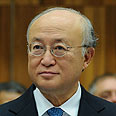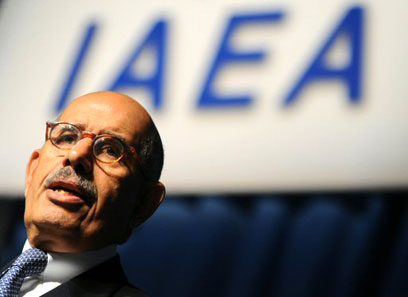
IAEA chief accused of pro-Western bias
Yukiya Amano relying on a very small group of people to determine policy towards Iran's nuclear program, former UN nuclear watchdog officials tell The Guardian: 'He wields a big stick and has hit Iran hard and repeatedly'
Several former senior officials at the International Atomic Energy Agency (IAEA) have accused the current head of the UN's nuclear watchdog, which is at the heart of the growing Iranian crisis, of pro-Western bias, over-reliance on unverified intelligence and of sidelining skeptics, The Guardian reported Thursday.
Yukiya Amano, a Japanese diplomat, took over as head of the IAEA in July 2009. Since then, the west's confrontation with Iran over its nuclear program has deepened and threats of military action by Israel and the US have become more frequent.
Related articles:
In November the IAEA published a report pointing towards past Iranian work on developing a nuclear weapon, deeming it credible.
However, the British newspaper said, some former IAEA officials are saying that the agency has gone too far. Robert Kelley, a former US weapons scientists who ran the IAEA action team on Iraq at the time of the US-led invasion, told The Guardian there were worrying parallels between the west's mistakes over Iraq's supposed weapons of mass destruction then and the nuclear watchdog's assessment of Iran now.
"Yukiya Amano is falling into the Cheney trap. What we learned back in 2002 and 2003, when we were in the runup to the war, was that peer review was very important, and that the analysis should not be left to a small group of people," Kelley was quoted as saying.
"So what have we learned since then? Absolutely nothing. Just like (former US vice-president) Dick Cheney, Amano is relying on a very small group of people and those opinions are not being checked."
According to The Guardian, other former officials have also raised concern that the current IAEA is focused on suspicions over Iran's program, without the "vigorous debate" that characterized the era of Amano's predecessor Mohamed ElBaradei.
"They point to Amano's decision, in March last year, to dissolve the agency's office of external relations and policy co-ordination (Expo), which under ElBaradei had second-guessed some of the judgments made by the safeguards department inspectors," the report said.

'More benefit-of-the-doubt operator.' ElBaradei (Photo: AFP)
One former agency official told the British daily, "There has been a concentration of power, with less diversity of viewpoints," adding that Amano has surrounded himself with advisors who have the same approach to Iran.
However, western diplomats in Vienna, where the IAEA is based, defended Amano's management, pointing out that much of the material on Iran's nuclear weaponization had been previously raised when ElBaradei ran the agency, albeit in less detail, and was based on 1,000 pages of documentation.
"It is arguable that ElBaradei was a slightly more benefit-of-the-doubt operator than Amano," one diplomat told The Guardian. "He might have fretted more about making judgments on evidence because he didn't have 100% confirmation. Amano says, 'I don't have 100% certainty, but it makes no sense saying nothing until a smoking gun is visible.'"
According to The Guardian, some of the controversy around Amano's management dates to his election in 2009, when he narrowly beat Abdul Minty, a South African diplomat who championed the interests of developing countries organized in the Non-Aligned Movement.
Joseph Cirincione, president of the Ploughshares Fund, a Washington-based non-proliferation organization, told the British newspaper that "the main beneficiaries of the Amano reign have been US policy and the Japanese nuclear power industry. There has been no space between Amano and Barack Obama, and he withheld serious criticism of the industry during the Fukushima crisis.
"On Iran, the difference is like night and day. ElBaradei constantly sought a diplomatic solution, while Amano wields a big stick and has hit Iran hard and repeatedly," he added.
However, Cirincione added, ElBaradei's more restrained approach had not succeeded in convincing the Islamic Republic to suspend its enrichment of uranium in line with UN security council demands.
The IAEA would not comment on the criticisms, under a policy which avoids entering public debate, the report said.
- Receive Ynetnews updates directly to your desktop










